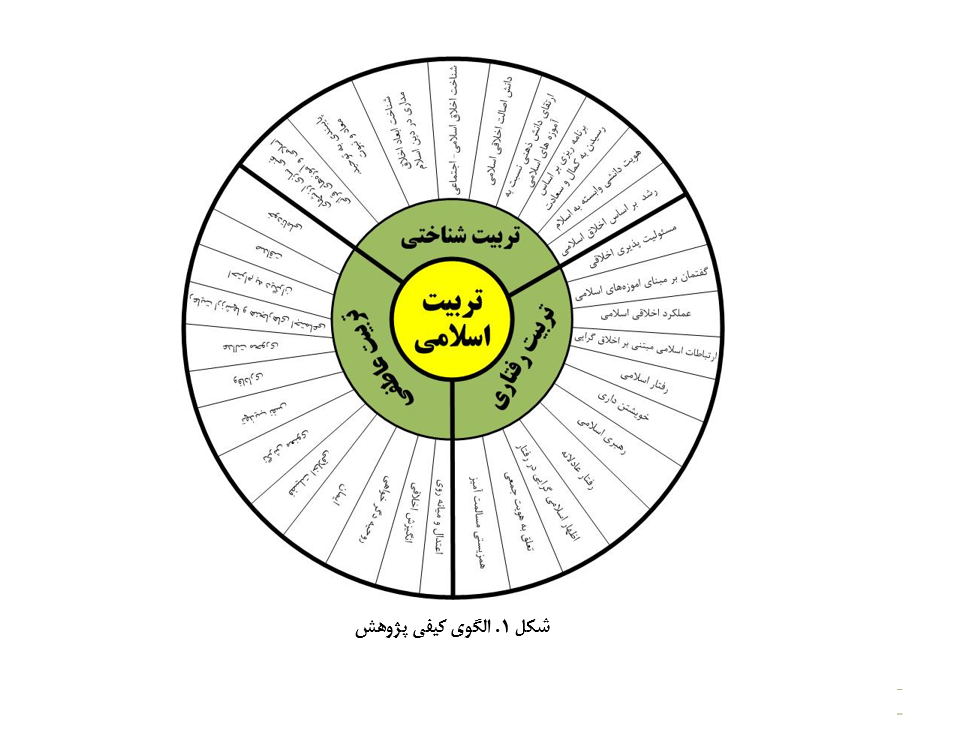Proposing a Qualitative Model of Islamic Education in Secondary Schools of Tehran Using the Grounded Theory Method
Keywords:
Qualitative model, Islamic education, secondary schools, grounded theory methodAbstract
One of the most effective ways of promoting Islamic education in a society is by initiating this form of education within schools. The aim of the present study is to propose a qualitative model for Islamic education in secondary schools in the city of Tehran. This research employed a qualitative methodology and, in terms of purpose, is categorized as applied/fundamental research. The research tools included semi-structured interviews, document analysis, and examination of web pages as visual media to ensure methodological triangulation. The target population comprised academic and practical experts in the field of Islamic education in schools. For data analysis, the grounded theory method was employed. The sample size was not predetermined, and sampling continued until theoretical saturation was achieved. The findings indicated that the components of Islamic education include cognitive education, emotional education, and behavioral education. Based on these identified components, the final model of the study was presented. According to the findings, it can be concluded that Islamic education in schools is a multidimensional phenomenon. Therefore, educational authorities and policymakers must adopt an approach that considers all influential components to move toward an optimal model of Islamic education.
Downloads
References
Darbandi M, Darbandi M, Amini M, editors. Islamic Education for Students from the Perspective of the Explanation Model. 5th National Conference on Professional Research in Psychology and Counseling with a Teacher's Perspective; 2023.
Didgah Z, Shariati S, Beheshti S, Imani Nayini M. Explaining the Role of Responsibility in the Social Education of Adolescents Based on the Interpretation of Al-Mizan. Culture of Counseling and Psychotherapy. 2018;9(34):27-56.
Barfar K, Ranjbarian R. The Impact of Teacher Characteristics in Islamic Education on the Islamic-Iranian Progress Model. Scientific Quarterly of Studies on Islamic-Iranian Progress. 2023.
Haj Khazimeh M. Examining the Relationship Between Teachers' Professional Ethics and Organizational Health in Public Boys' Elementary Schools in Tehran. University of Tehran2015.
Khosrojerdi A, editor Examining the Importance of Islamic Education for Students. 5th National Conference on Professional Research in Psychology and Counseling with a Teacher's Perspective; 2023.
Samadi Miyarkalaei H, Samadi Miyarkalaei H, Babayi A, Asgari A, editors. The Effects of Ethics on Entrepreneurship and Business. National Conference on Entrepreneurship and Management of Knowledge-Based Businesses; 2012; University of Mazandaran.
Mohammadi Bastanouei M, editor The Position and Role of Education in Islamic Modern Civilization. 3rd International Conference on Educational Sciences, Psychology, Counseling, and Education; 2023.
Bavafa Kharaqei MB, Savari H, editors. The Role of Good Morality in the Educational Process of Students. 2nd International Conference on Research in Accounting, Management, Economics, and Humanities; 5th National Conference on Professional Research in Psychology and Counseling with a Teacher's Perspective; 2023.
Khari Arani M, Rahnama A, Sobhani Nejad M. Comparative Study of Philosophical Foundations of Moral Education from the Perspectives of Allameh Tabatabai and Levinas. 2020.
Heslep RD. Moral Education for American. Westport, CT: PraegarER -; 2015.
Zare S, Karami F, Pourmohammad M. The Impact of Need-Based Teaching Methods in the Course 'Life Skills' on Moral Education of Student Teachers at Farhangian University in Gilan Province. Epistemological Studies in Islamic Universities. 2021;87:557-72.
Kiayi Z, Abolmalali K, Bagheri F. The Existential Structure of Humans in the Quran and Its Application in Educational Areas Based on the Fundamental Transformation Document of Education. Research on Issues in Islamic Education. 2021;50:135-75.
Koushi Z, Mousapour Nm, Mohbi A, Armand M. Identifying Dimensions and Components of Moral Education with a Social Approach. Quarterly Journal of Applied Issues in Islamic Education. 2018;3(2):117-42. doi: 10.29252/qaiie.3.2.117.
Goli S, Dousti M, Dousti Z, Goli M, editors. Foundations of Islamic Education. 3rd National Conference on Psychology, Education, and Lifestyle; 2019.
Lo Piano S. Ethical principles in machine learning and artificial intelligence: cases from the field and possible ways forward. Humanities and Social Sciences Communications. 2020;7(1):1-7. doi: 10.1057/s41599-020-0501-9.
Gaspar M. Ethical considerations in Music Education: The professional development of guitar ensemble instructors for Singapore's Ministry of Education (MOE) schools. Academia Letters. 2022;2. doi: 10.20935/AL4597.
Jannat T, Alam SS, Ho YH, Omar NA, Lin CY. Can corporate ethics programs reduce unethical behavior? Threat appraisal or coping appraisal. Journal of Business Ethics. 2022;176(1):37-53. doi: 10.1007/s10551-020-04726-8.
Mohammadi Nayini M, Hosseini M, editors. The Position of Student Education from the Perspective of Islamic Thinkers with an Emphasis on Synthesis Research. 5th National Conference on Professional Research in Psychology and Counseling with a Teacher's Perspective; 2023.
Moradhasel M. Correct Methods of Education. Qom: Spiritual Research; 2018.
Pournajaf E, Seyedi Jorbandi SF, editors. Teacher and Moral Education from the Perspective of Martyr Motahari. 4th International Conference on Humanities and Education; 2018; Tehran.

Downloads
Published
Submitted
Revised
Accepted
Issue
Section
License
Copyright (c) 2025 HossienReza ShamlooJany, Hadi Rezghi Shisavar, Hamid Shafizadeh (Author)

This work is licensed under a Creative Commons Attribution-NonCommercial 4.0 International License.










